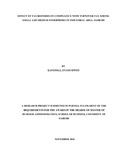| dc.description.abstract | Turnover tax was introduced in 2008 as simple tax so as to bring small and medium enterprises into tax net. This was to boost collection on revenue, increase tax administration efficiencies and reduce collection costs thus increasing tax compliance in Small and Medium Enterprises sector. Despite reforms that have been undertaken to improve compliance with turnover tax (TOT) lot remains to be done to achieve the desired results that were anticipated when TOT was introduced (KRA, 2015). The main objective of this study was to assess the effects of tax reforms on compliance with turnover tax among small and medium enterprises operating in industrial area, Nairobi City County. This study used descriptive survey research design. The total population was 1240 SMEs registered by the Kenya Revenue Authority. The study used stratified and convenience sampling to sample 15% (186) of total population. The study used questionnaire to collect primary data from the SMEs. Logistic regression analysis was used to assess effects of tax reforms on tax compliance among targeted enterprises. The study found out that tax compliance level among SMES was at 60% while noncompliance was estimated at 40%.The study found out that 86.7% of the SMEs filed their tax returns online while 13.3% of them filed their returns manually at KRA. The study found out that 73.3% had been trained while 26.7 % had not been trained. This study found out that 80% of the SME had been audited by KRA, 13.3% had not been audited whereas 6.7% did not respond. SMEs that had been audited said were penalized and penalties ranged from Kshs 0 to kshs 25,000. The study found that the tax rates in Kenya were high as was reported by 72% of SMEs. Regression and correlation analysis shows in general a high and positive relationship between tax reforms and tax compliance. That is tax reforms including tax rate regime, taxpayers’ training and education and online tax filing has positive effects (increases) tax compliance in SMEs sector. The significant at 5 significant level and so we can rely on this to conclude that compliance of turnover tax is appropriate. However, tax penalties and technical support were found not correlated to tax compliance. The study recommends that to have a fully compliance with turnover tax system among SMEs in Kenya, the small traders should be made to understand the tax administration through the turnover tax training and education so that they are encouraged to pay taxes promptly. KRA also need to train taxpayers on how to calculate the tax payments and balancing their accounts afterwards, how to fill in the files/forms while registering and filing for the turnover tax and being taught the benefits that accrues from many businesses complying with the tax payment. In addition, KRA need to lower and simplify tax regime so as to improve tax compliance. | en_US |



